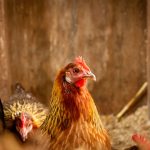Chickens are highly susceptible to heat stress, as they lack sweat glands and rely on panting to regulate their body temperature. When temperatures rise, chickens can quickly become overheated, leading to a range of health issues such as decreased egg production, reduced feed intake, and even death in severe cases. Heat stress can also compromise the immune system of chickens, making them more susceptible to diseases and infections.
Additionally, high temperatures can cause dehydration, leading to electrolyte imbalances and further health complications. It is crucial for chicken owners to understand the impact of heat on their flock in order to implement effective strategies to mitigate its effects. Furthermore, it is important to recognize the signs of heat stress in chickens, which include panting, lethargy, reduced egg production, and spreading their wings to dissipate heat.
By understanding the impact of heat on chickens and being able to identify the signs of heat stress, chicken owners can take proactive measures to ensure the well-being of their flock during hot weather.
Table of Contents
- 1 Providing adequate shade and shelter for chickens
- 2 Ensuring access to cool, fresh water at all times
- 3 Implementing cooling methods such as misting or fans
- 4 Adjusting feeding schedules and types of feed to accommodate hot weather
- 5 Monitoring chicken behavior and health during heatwaves
- 6 Preparing for heatwaves in advance with proper management and planning
- 7 FAQs
- 7.1 How can I keep my chickens cool during a heatwave?
- 7.2 What are some signs that my chickens are overheated?
- 7.3 Should I change my chickens’ feeding routine during a heatwave?
- 7.4 Can I use a sprinkler to cool down my chickens?
- 7.5 What are some long-term strategies for keeping chickens cool in hot climates?
Key Takeaways
- Heat stress can significantly impact the health and productivity of chickens, leading to decreased egg production and increased mortality rates.
- Providing adequate shade and shelter is crucial for chickens to escape the direct heat of the sun and prevent heat-related illnesses.
- Access to cool, fresh water at all times is essential to help chickens regulate their body temperature and stay hydrated during hot weather.
- Implementing cooling methods such as misting systems or fans can help lower the ambient temperature in chicken coops and reduce heat stress.
- Adjusting feeding schedules and types of feed can help chickens cope with hot weather and maintain their nutritional needs.
- Monitoring chicken behavior and health during heatwaves is important to identify signs of heat stress and take necessary actions to prevent illness or death.
- Preparing for heatwaves in advance with proper management and planning can help minimize the impact of hot weather on chickens and ensure their well-being.
Providing adequate shade and shelter for chickens
Creating a Cooler Environment
One of the most important steps in preventing heat stress in chickens is to provide adequate shade and shelter. This can be achieved by ensuring that the chicken coop is well-ventilated and positioned in a shaded area. Natural shade from trees or structures can also be utilized to create a cooler environment for the chickens.
Regulating Body Temperature
Additionally, providing access to dust baths can help chickens regulate their body temperature by allowing them to cool off in the loose soil. In addition to shade, it is essential to provide proper shelter for chickens during hot weather.
Insulating the Coop
This includes ensuring that the coop is well-insulated and protected from direct sunlight. Consider using reflective materials on the roof of the coop to reduce heat absorption. Providing ample bedding inside the coop can also help insulate the chickens from the heat.
By providing adequate shade and shelter, chicken owners can help their flock stay cool and comfortable during hot weather.
Ensuring access to cool, fresh water at all times

Access to cool, fresh water is essential for chickens to stay hydrated and regulate their body temperature during hot weather. It is important to regularly check water sources to ensure that they are clean and cool. Consider using shaded water containers or adding ice to the water to keep it cool throughout the day.
Additionally, increasing the number of water stations in the chicken coop can help ensure that all chickens have access to water at all times. Furthermore, consider adding electrolytes to the chickens’ water supply during periods of extreme heat to help replenish lost nutrients and minerals due to dehydration. Electrolytes can help maintain the chickens’ overall health and well-being during hot weather.
By ensuring access to cool, fresh water at all times, chicken owners can help prevent dehydration and heat stress in their flock.
Implementing cooling methods such as misting or fans
In addition to providing shade and shelter, implementing cooling methods such as misting systems or fans can help lower the ambient temperature in the chicken coop. Misting systems can be installed to create a fine spray of water that evaporates quickly, cooling the surrounding air. Fans can also be used to improve air circulation and reduce heat buildup inside the coop.
Position fans strategically to create cross-ventilation and ensure that all areas of the coop receive airflow. Another effective cooling method is to use frozen water bottles or ice packs inside the coop. Placing these frozen items near where the chickens rest can help lower the surrounding temperature and provide relief from the heat.
Additionally, consider using wet burlap sacks or towels as a cooling surface for chickens to lie on. By implementing these cooling methods, chicken owners can help create a more comfortable environment for their flock during hot weather.
Adjusting feeding schedules and types of feed to accommodate hot weather
During hot weather, it is important to adjust feeding schedules and types of feed to accommodate the changing needs of chickens. Consider feeding chickens during the cooler parts of the day, such as early morning or late evening, to reduce heat production from digestion. Additionally, providing smaller, more frequent meals can help prevent overheating and reduce metabolic heat production.
Furthermore, consider adjusting the types of feed given to chickens during hot weather. Feeding high-protein diets can increase metabolic heat production, so consider switching to lower-protein feeds during periods of extreme heat. Additionally, supplementing feed with electrolytes and vitamins can help support overall health and hydration in chickens during hot weather.
By adjusting feeding schedules and types of feed, chicken owners can help reduce heat production and support their flock’s nutritional needs during hot weather.
Monitoring chicken behavior and health during heatwaves

Recognizing Signs of Heat Stress and Dehydration
During heatwaves, it is crucial to closely monitor chicken behavior and health to identify signs of heat stress or dehydration. Keep an eye out for panting, lethargy, reduced egg production, and changes in behavior such as aggression or listlessness.
Regular Health Checks
Additionally, regularly check on the chickens’ overall health by observing their posture, breathing rate, and appetite.
Tracking Weight Loss
Furthermore, consider weighing individual chickens regularly to track any significant weight loss, which can be an indicator of dehydration or heat stress.
Proactive Approach to Prevent Health Complications
By monitoring chicken behavior and health during heatwaves, chicken owners can quickly identify any issues and take immediate action to address them. This proactive approach can help prevent serious health complications and ensure the well-being of the flock during hot weather.
Preparing for heatwaves in advance with proper management and planning
In addition to implementing strategies to mitigate the effects of heat on chickens, it is important for chicken owners to prepare for heatwaves in advance with proper management and planning. This includes conducting regular maintenance on the chicken coop’s ventilation systems, ensuring that fans and misting systems are in good working condition before hot weather sets in. Furthermore, consider stocking up on essential supplies such as electrolytes, vitamins, and additional water containers in preparation for heatwaves.
Having these supplies on hand will allow for quick intervention if needed during periods of extreme heat. Additionally, develop a plan for emergency cooling methods such as setting up temporary shade structures or using portable misting systems if temperatures become dangerously high. By preparing for heatwaves in advance with proper management and planning, chicken owners can minimize the impact of hot weather on their flock and ensure that they are well-equipped to handle any challenges that may arise.
This proactive approach can help maintain the health and well-being of chickens during periods of extreme heat. In conclusion, understanding the impact of heat on chickens is crucial for implementing effective strategies to mitigate its effects. Providing adequate shade and shelter, ensuring access to cool, fresh water at all times, implementing cooling methods such as misting or fans, adjusting feeding schedules and types of feed, monitoring chicken behavior and health during heatwaves, and preparing for heatwaves in advance with proper management and planning are all essential steps in ensuring the well-being of chickens during hot weather.
By taking proactive measures and being attentive to their flock’s needs, chicken owners can help their chickens stay cool and comfortable even in the midst of scorching temperatures.
If you’re looking for ways to keep your chickens cool during a heatwave, you might want to consider building an A-frame chicken coop. This type of coop provides good ventilation and shade, which can help keep your chickens comfortable in hot weather. For more information on A-frame chicken coops, check out this helpful article on poultrywizard.com.
FAQs
How can I keep my chickens cool during a heatwave?
During a heatwave, you can keep your chickens cool by providing plenty of shade, ensuring they have access to fresh, cool water at all times, and using fans or misters to lower the temperature in their coop or run.
What are some signs that my chickens are overheated?
Signs that your chickens may be overheated include panting, holding their wings away from their bodies, reduced egg production, and lethargy. It’s important to take action to cool them down if you notice these signs.
Should I change my chickens’ feeding routine during a heatwave?
During a heatwave, it’s a good idea to adjust your chickens’ feeding routine by offering cool, watery treats such as watermelon or cucumbers, and avoiding feeding them during the hottest part of the day.
Can I use a sprinkler to cool down my chickens?
Using a sprinkler to cool down your chickens can be effective, but it’s important to make sure that the water doesn’t create muddy or wet conditions in their coop or run, which can lead to health issues.
What are some long-term strategies for keeping chickens cool in hot climates?
Long-term strategies for keeping chickens cool in hot climates include providing adequate ventilation in their coop, planting shade trees or installing shade cloth in their run, and choosing chicken breeds that are well-suited to hot weather.
Meet Walter, the feathered-friend fanatic of Florida! Nestled in the sunshine state, Walter struts through life with his feathered companions, clucking his way to happiness. With a coop that’s fancier than a five-star hotel, he’s the Don Juan of the chicken world. When he’s not teaching his hens to do the cha-cha, you’ll find him in a heated debate with his prized rooster, Sir Clucks-a-Lot. Walter’s poultry passion is no yolk; he’s the sunny-side-up guy you never knew you needed in your flock of friends!







